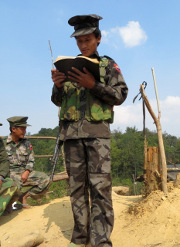
Burma (MNN) — What you hear isn't what you get when it comes to Burma.
You may have heard recently that the European Union (EU) lifted trade sanctions on Burma, a sign that the country is making progress. The restrictions, designed to economically bind Burma, were temporarily lifted last year following the election of new leadership.
When sanctions were suspended, the EU communicated four prerequisites for permanent removal: all political prisoners must be released, aid must be allowed into Burma, ethnic uprisings must be resolved, and life for the Rohingya people must be improved.
Earlier this week, all EU sanctions except the arms embargo were lifted permanently.
While the international audience applauds progress and a "changed" Burma, Human Rights Watch (HRW) paints a different picture.
It uses terms like ethnic cleansing and crimes against humanity in a report also issued earlier this week to describe Burma's Rakhine state. It says Burma's authorities took part in driving 125,000 Rohingya from their homes.
We talked with Dyann Romeijn of Vision Beyond Borders to see what's really going on.
"It's not the large, massive genocide that you're seeing in Sudan or places like that," says Romeijn. "It's ongoing and it's continual.
"It's not just merely killing people in fighting, but a lot of times it involves torture, it involves trying to instill fear in these people so that they will surrender to the government."
Untold thousands are suffering as the government tries to purge Burma of different people groups. In the Kachin state, VBB says over 250,000 people are now displaced.
"The Burma army came into our village without warning; they burned and destroyed our village," one pastor told VBB's partners, Christian Far East Ministries. "Since we are all Christians, our church was immediately burned down, and we lost all the Bibles we had in there.
"None of us can or dare to go back to our village; it is surrounded by the Burmese Army. We heard that many land mines were placed around our village."
Approximately 90% of the displaced Kachin people are Christian. Pray that these Christ-followers will have opportunities to share the Gospel with other refugees.
